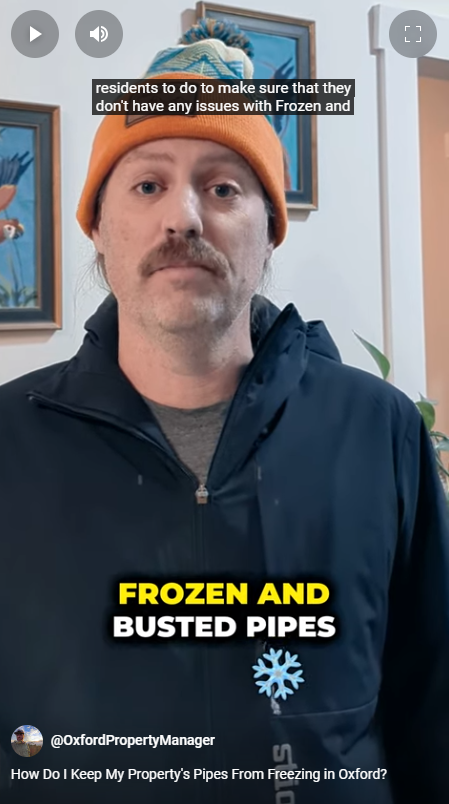Whether you're a seasoned property owner or new to rental management in Oxford, frozen pipes are a serious concern that's often overlooked until it's too late. The video above offers a quick guide you can share with your residents - but let's dive deeper into protecting your investment.
Start with Your Lease
First things first: your lease should include detailed cold weather instructions. This isn't just about protection - it's about setting clear expectations and responsibilities from day one. If your lease doesn't include these guidelines, it's time for an update.
The Oxford Challenge
Our local properties face unique risks during winter, particularly around extended vacancies, because students go home when they finish finals in early December. While many only think about student rentals, Oxford's greater academic community also creates a distinct pattern - university professors are off like students, so they often leave town for extended periods during the coldest months of the year whether to attend conferences, visit family, or travel.
However, frozen pipes don't only threaten vacant properties; significant damage can occur in occupied homes when residents simply don't know the proper prevention steps.
Prevention Steps That Work
- Keep a pencil-lead width stream of water flowing from both hot and cold taps
- Open cabinet doors under sinks, especially on exterior walls
- Leave water heater closet doors open
For Extended Vacancies:
- Keep the heat at 60 - 65 degrees minimum
- Shut off the water at the meter
- Open all faucets
- Drain the system by flushing toilets
- Turn off electric water heaters at the breaker
Don't Forget the Outside Exterior faucets need attention too:
- Unhook all water hoses
- Cover them with insulated protectors from local hardware stores
- In a pinch, wrap them with rags and secure them with duct tape
Get started now. Don't wait until extreme temps are here!
- Talk to your residents about winter preparation
- Share the video above with your residents
- Create simple prevention checklists
- Know who to call in emergencies
For student properties, remember that early December communication is crucial. Even though it might be mild weather when they leave for break, January could bring extended freezing temperatures.
If you have any questions about protecting your investment and ensuring your residents have a safe, comfortable home this winter, don't hesitate to reach out!


